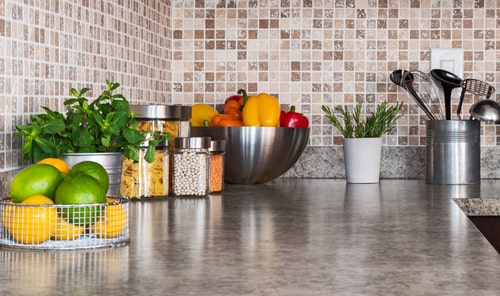Green Gourmet: 7 Simple Hacks for an Eco-Friendly Kitchen
Upwards of 70 per cent of the waste produced by an average Indian home originates in the kitchen.

The kitchens in our homes have a big carbon footprint. They are the space where we guzzle a lot of energy, use a large amount of freshwater and add to the problem of single-use plastic. If you are taking the first steps towards going greener in your home, the kitchen is one of the first places to start.
But a green kitchen means a lot more than merely cutting out the plastic, and there’s plenty one can do – from smarter ways of cleaning to preparing healthy meals – that can have a positive impact on the planet.
Here are seven ways to help you go green in the kitchen:
1. Reduce Your Kitchen’s Water Footprint
You can significantly cut your water usage in the kitchen in a few ways. First, install a water aerator on your taps. These tiny devices are huge savers. They reduce water flow by mixing air into the stream and cut water wastage without affecting pressure. They are especially useful to save water wasted by splashing when washing dishes.
Another way to get smart with water is by saving the run-off from RO-based water purifiers. On average, these purifiers waste about 3-4 litres per litre of potable water produced. Collect this discharge in a bucket and use it for household cleaning or in the garden.
You can also minimise the volume of water used to wash dirty dishes. Rinse dirty dishes to wash off the grease and food particles before soaking for a few minutes. This makes it easier to clean and uses less water.
2. Banish the Chemicals
In our effort to keep our kitchens safe, clean and hygienic, we smother them with a variety of toxic chemicals. From the dish soap and floor cleaners we use to the oven cleaning sprays and disinfectant wipes, our kitchens regularly put us in harm’s way. Fortunately, chemical-free cleaners such as The Better Home are available which are light on the pocket and the planet. They are made of naturally-derived materials, are biodegradable, non-toxic and skin-friendly. They get rid of dirt, grime and bacteria without exposing us to toxic chemicals. For cleaning glass and other surfaces, a simple mix of baking soda, vinegar and warm water can work wonders to get rid of stains and grease.
3. Minimise Single-Use Plastic
One only needs to open a drawer to find that we rely a lot on single-use plastic and disposables in the kitchen. Cling film, aluminium foil, dustbin liners, Ziploc bags – the list is endless. The idea of doing a kitchen rehaul is to replace these items with greener alternatives that are reusable, multi-purpose, and affordable. Once you start replacing the disposables in your kitchen, there’s no looking back. Begin by investing in a set of reusable grocery bags, kitchen towels and lids of different sizes. This cuts out a fair number of disposables from your life such as plastic bags, paper towels, wet wipes and cling wrap. You can also buy reusable fridge bags that keep veggies, and other produce fresh in the fridge for days without the use of plastic bags.
4. Compost Your Kitchen Waste
Upwards of 70 per cent of the waste produced by an average Indian home originates in the kitchen. Composting is the easiest and quickest way to adopt a greener lifestyle and learn to recycle. This simple act can prevent food waste from adding to the already-overburdened municipal waste collection system and from ending up in landfills. It also helps save plastic dustbin liners and garbage bags. Set up a composting kit on your balcony or in your garden to collect and recycle your organic waste. If you don’t have a garden to use your compost in, share it with friends or donate it to a public park or your apartment’s garden.
5. Bulk is Beautiful
Bulk is a good word in the kitchen as it helps you save resources and cut down on waste. Whether you’re buying groceries, cleaning products and household goods or cooking meals, do so in bulk. Bulk purchases mean less packaging, lower energy costs, fewer trips to the market, and at times, even a financial saving. In the case of cooking, preparing meals in bulk allows you to save fuel, use (and clean) fewer dishes and use your free time to engage in the other activities you enjoy.
6. Minimise Waste
The kitchen is the biggest producer of all kinds of waste in our homes. It generates waste all through the process of buying and preparing meals, in the form of post-meal leftovers, water and energy wastage and single-use plastic.
Minimise food waste by planning your meals so you buy or cook only as much food as you will eat. Do not hesitate to eat leftovers or use them in your cooking. As far as possible, avoid purchasing items that can be easily made at home. Pre-cut fruits and vegetables, cling-wrapped cobs of corn, ready-to-eat meals, sauces and chutneys, for instance. These foods are often over-packaged to preserve their freshness and bring a whole lot of unnecessary waste to your home. Whenever you can, avoid multi-layered plastic packaging since it has no recycling value. Also stay away from single-use sachets of condiments, spices and other foods as they escape the recycling system.
7. Up the Energy-Efficiency
There are several ways to reduce energy usage in a modern kitchen, beginning with the way you cook your meals. Prevent heat loss by covering cooking pots. When you use a small dish on a large-sized burner, you are producing more heat than you need, so you are wasting energy. Always match the size of the dish to the burner size to make optimum use of the flame.
Prevent heat loss from your refrigerator by placing it away from heat sources like the oven or stove. Maintain some space between the fridge and the wall so air can circulate and prevent the coils from heating up. Set your refrigerator and freezer at the optimum temperature and improve energy efficiency by preventing frost build-up.
This story made me
- 97
- 121
- 89
- 167
Tell Us More
We bring stories straight from the heart of India, to inspire millions and create a wave of impact. Our positive movement is growing bigger everyday, and we would love for you to join it.
Please contribute whatever you can, every little penny helps our team in bringing you more stories that support dreams and spread hope.



















